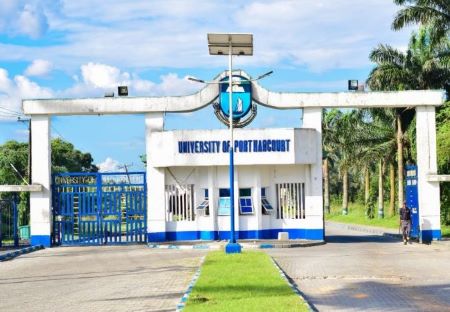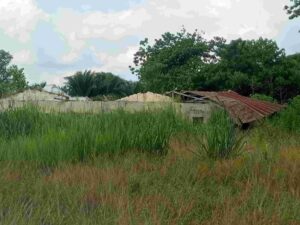Keeping the school environment clean is one of the responsibilities of the school management and also a collective responsibility of the staff and students of the institution. A clean environment ensures a serene and healthy learning environment for learners and school authorities.
Within the University of Port Harcourt, Campus Environmental Beautification and Sanitation Unit (CEBAS) is the unit in charge of refuse disposal and sanitation Close to three months now CEBAS has since been struggling with refuse and disposal sites. This is as a result of the mishandling and improper way of disposing of refuse by students and as well business owners around the school campus.

Around the refuse sites, improper refuse disposal has become a norm. Many of the refuse are not properly packed before disposal or are often carelessly disposed of without the use of refuse bags. The school environment itself is filled with dried leaves. There is also indiscriminate disposal of refuse almost everywhere which had constituted an eyesore.

Some of this indiscriminate refuse disposal sites around the school environment are the disposal sites at Mandela hostel block D, the side of NDDC hostel, Abuja campus, and also the one at Delta campus (King Jaja hostel precisely (block C).
Photographs taken from these dump sites showed improper disposal of the waste which exposed the students and staff of the university to air pollution and thereby increasing the risk of reptiles, insects and exposure to epidemics for those residing in the hostels and other residential areas inside the school environment.
Prior to now, the director of CEBAS, Dr Lucky Ajor, when asked some critical questions concerning the challenges they faced by the unit highlighted some minor challenges. According to Dr Ajor, “The unit for now lack enough refuse disposal vans, funding issues with regards to purchase of diesel to power the limited vehicles especially in the current economic situation of the country”.

In addition, Dr Ajor said “There are also financial challenges (like sufficient funds to pay the workers, funds to buy other important safety equipment”. But more than ever before, students’ habit characterised by improper refuse disposal is also a big issue. In most cases many students will not use the waste disposal bag before they drop the dirt

But in all Dr. Ajor praised and commended the school management for its efforts towards making the school environment clean.
A cross section of University’s students interviewed shared their views also. All preferred to be anonymous because of possible victimisation. A student, who stays at NDDC hostel Abuja campus, critically complained about the offensive odour that comes out from this waste.
To this individual, “It is hazardous to expose students to this kind of messy environment as it can lead to breathing and other lung associated diseases. The student urged the school management to put in place refuse disposal rules which will bind all students and staff in school”.
Another student who resides at King Jaja hostel, Delta campus, commended the school management and the CEBAS unit for their efforts in ensuring the school environment is clean, but urged the school management to provide a conducive environment for refuse disposal on the campus.
The student affirmed “Disposing the refuse close to students’ hostel is not healthy as it can become home to dangerous insects such as cockroaches, mosquitoes and also reptiles”.
A resident of Mandela hostel block D, Abuja campus, decried the excess waste dropped by the Side of the hostel. According to him “The level at which refuse is dumped in the site has exposed the residents living in the hostel and its environs to offensive air pollution”.
But he warned that students who improperly drop refuse should be punished. Everyone must use the refuse bag while the school management should ensure availability of refuse bags as well as ensure refuse dump sites are far from hostels’ environment.
In an interview with the supervisor of NDDC hostel, Mr Joseph, who also raised concern over the mishandling of waste around NDDC hostel, said the refuse dump around the hostel premises is a problem to the residents of the hostel. According to him, “Aside from associated health risks, the refuse is obstructing movements of students and staff around the hostel premises”.
Furthermore, Mr Joseph commended the school management for the measures they put in ensuring the school environment is well kept and clean, but added that, the management should ensure a good refuse disposal site. New ones can be built with levels of safety guaranteed. Beyond this, refuse must be daily evacuated from the dump sites.
Responding to insufficient numbers of trucks as well as funds for diesel and trucks, Mr Joseph said, “The school management should generate funds to buy trucks and hand them over to CEBAS. An allocation for diesel should also be considered each day to ensure efficiency of operations in each campus”.
He also urged the cleaners working in the hostels to stop scattering the refuse in the disposal sites, because doing such will enhance and build up an offensive odour. He urged them to make the wastes be parked in refuse disposal bags before disposing them.
But another concerned student said “Keeping the school environment clean should be a collaborative effort by all the stakeholders. The students, business owners within the campuses and management must play their roles”.
“Students must see cleanliness as a virtue. So proper disposal of dirt/waste should be a lifestyle, especially students who live in the hostels. Punishments should be given to disobedient ones.”
Furthermore, all business owners in the school, especially the restaurant owners must ensure the items they use for cooking and food leftovers should be disposed through the disposal bags and covered properly.



